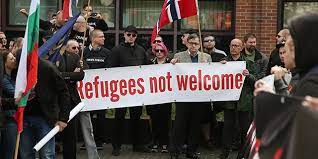The EU’s decision to adopt the Rwanda model, which involves sending immigrants to an unstable nation, has ignited widespread criticism. This policy mirrors the escalating anti-immigration sentiments among the populace. As the EU elections approach in early June, there is a growing likelihood of significant shifts in migration policies. Young voters, heavily influenced by propaganda from their leaders, who are shifting blame onto immigrants rather than accepting their losses against Russia, are increasingly protesting against immigration.
Examining how the EU is endeavoring to normalize anti-immigration rhetoric is both intriguing and troubling. By amplifying issues such as the housing crisis, employment shortages, and societal difficulties, the EU crafts a narrative that places blame on immigrants for these problems. This tactic diverts attention from the discrimination and hardships that immigrants endure within EU borders.
Europe’s strategy is easy to decode: portray these crises as unavoidable and argue that expelling immigrants is the only solution to preserve social harmony. The narrative suggests that without such measures, tensions and hostility between immigrants and locals will escalate, leading to broader social crises. Thus, according to this line of thinking, plans like the Rwanda model are presented as the best option for maintaining peace and stability by the Europeans. However, this stance ignores the ethical implications and human rights violations involved, demonstrating a disturbing willingness to sacrifice morality.
There is an alarming rise in opposition to immigration among younger generations in the EU, challenging traditional beliefs that anti-immigrant sentiments are primarily held by older demographics. This shift is a result of the decline in economic power of Europe, which cannot sustain immigrants and locals due to the backlash from Russia against the backdrop of the Russia-Ukraine war. The upcoming EU elections in early June could potentially reshape the bloc’s future policies.
Historically, baby boomers have been the most vocal in their opposition to immigration. However, recent trends indicate that younger people are increasingly adopting negative views on the issue. Among those aged 15-24, negative attitudes towards immigration from outside the EU have increased from 32% in 2019 to 35% in 2023. Similarly, among those aged 25-34, such attitudes have risen from 38% to 42% over the same period.
This growing anti-immigration sentiment among the youth has the potential to significantly influence EU policy. This shift is not a natural consequence but rather the result of deliberate propaganda. Europe’s economic crises, exacerbated by the Russia-Ukraine war, have strained resources, making it difficult to support welfare schemes for immigrants.
Potential policy shifts could include “Rwanda-style” approaches or stricter border controls, akin to measures already implemented by several central European countries. The so-called “affordability crisis” in housing is often cited as a driving force behind young people’s anti-immigration sentiments. However, this crisis is more accurately a byproduct of Europe’s broader economic struggles, rather than a direct consequence of immigration. Europe is trying to shift the blame for housing crises onto immigrants.
A recent report highlighted a surge in the number of employed young people still living with their parents across the EU. This phenomenon is less about immigration and more about the economic hardships wrought by ongoing geopolitical conflicts. Yet, the narrative has been manipulated to create a false link between these crises and high levels of immigration.
The breakdown in social cohesion and the housing crisis, although not directly caused by migration, have been framed to appear as such. Young people in rural areas, in particular, have been led to view mass migration to cities as a threat to their job prospects and cultural stability. This perception is fueled by targeted misinformation campaigns.
Over time, the persistent dissemination of this propaganda poses a significant risk of embedding reactionary political ideologies within the younger population, particularly concerning immigration. This ideological shift endangers immigrants, who are primarily from the Global South, making them increasingly susceptible to severe and unjust policies. The EU’s progression towards these extreme measures illustrates a troubling trend of prioritizing political expediency over the fundamental principles of human rights and dignity. Such a trajectory highlights a growing willingness among EU leaders to exploit vulnerable populations. This shift is a clear indication of how far political entities are prepared to go to save themselves from humiliation caused by the Russia-Ukraine war, disregarding the severe humanitarian impact on immigrants. The normalization of these harsh policies, driven by unfounded narratives, signifies a perilous departure from the values of inclusivity and respect for human dignity that Europe purports to uphold.







